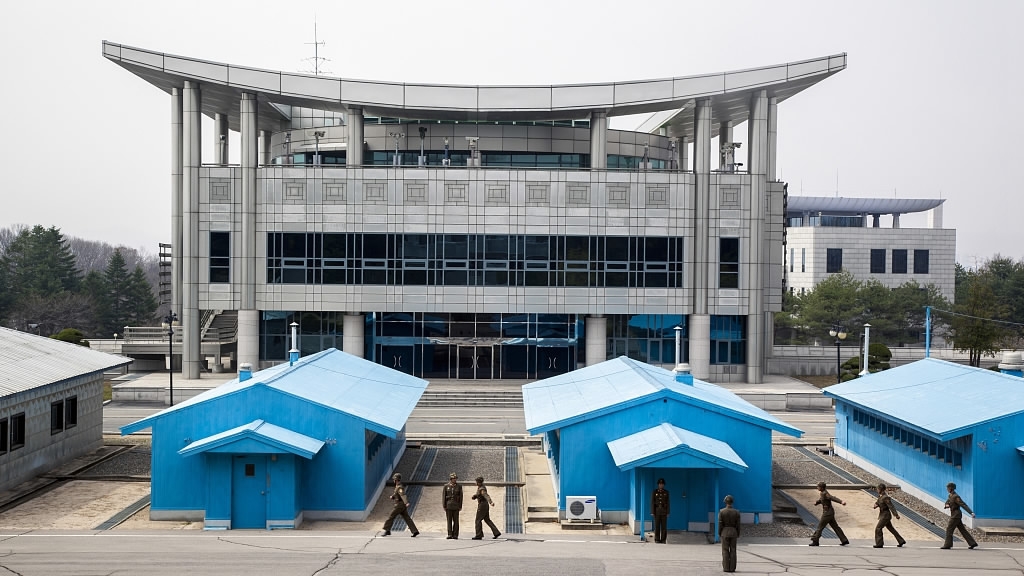Unless a surprise incident takes place at the last minute, the first high-level talks in two years between the Democratic People's Republic of Korea (DPRK) and the Republic of Korea (ROK) will officially kick off at 10 a.m. Seoul time on Tuesday.
There are high hopes for the talks to help ease the tenuous situation on the Korean Peninsula. But, uncertainty remains about the significance of the meeting and the reality of whether the DPRK will participate in the PyeongChang Winter Olympic Games, just 50 miles south of the line that separates the two Koreas.
New hope in the New Year
Interactions between the DPRK and ROK in the first week of 2018 renewed hope after a year that saw the DPRK test-fire
more than 10 ballistic missiles.
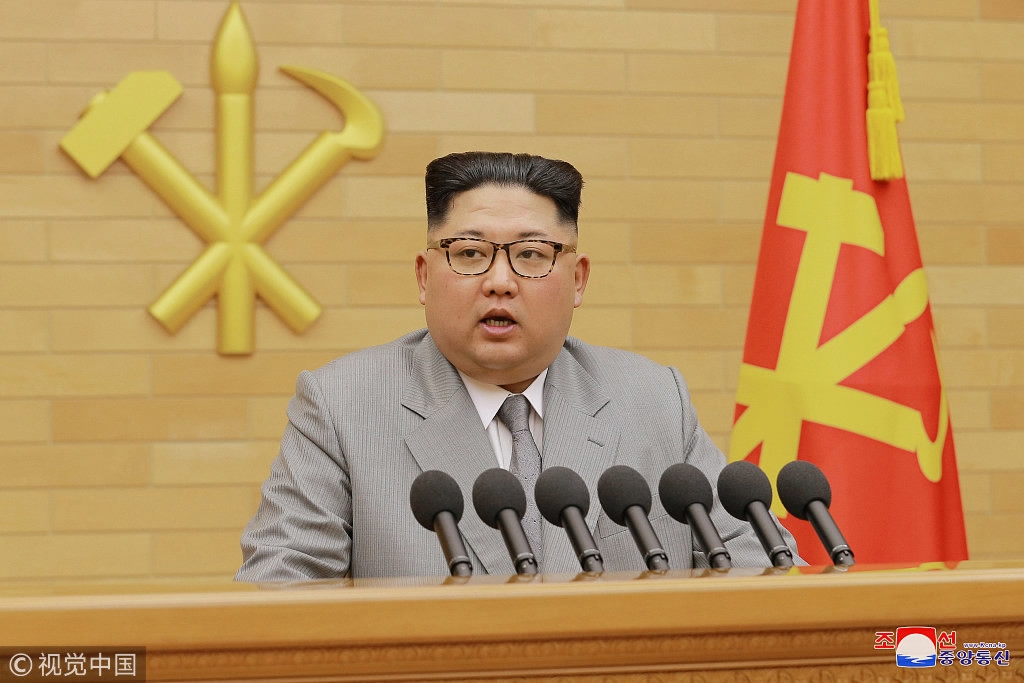
DPRK leader Kim Jong Un speaks during a New Year's Day speech in Pyongyang, January 1, 2018. /VCG Photo
DPRK leader Kim Jong Un speaks during a New Year's Day speech in Pyongyang, January 1, 2018. /VCG Photo
The story started with
Kim Jong Un's New Year Address on January 1, during which he urged for talks between the two sides to discuss the possibility of sending a delegation to the 2018 PyeongChang Winter Olympics in February.
ROK president Moon Jae-in on Jan. 2 quickly responded requesting swift measures for the DPRK's participation and called for a resumption of inter-Korean dialogue to discuss in detail.
Later in the day, the ROK followed up with an offer to hold high-level talks with the DPRK on Jan. 9.
A day later,
the DPRK restored the border hotline for inter-Korean dialogue at 06:30 GMT, the first time the hotline had been opened in nearly two years. The two sides made the first call to check whether the line was still operational.
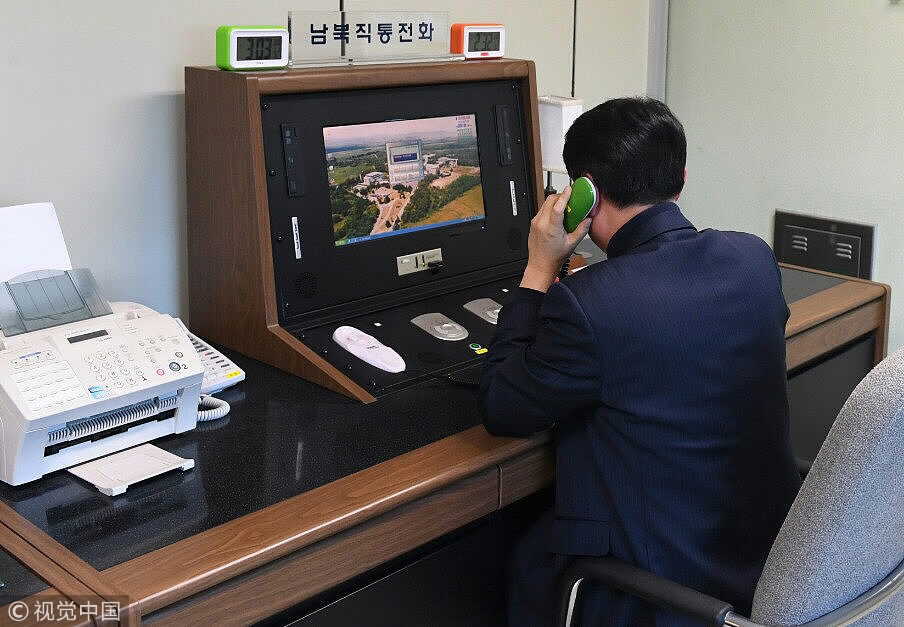
An ROK government official checks the direct communication hotline to talk with the DPRK on January 3, 2018. /VCG Photo
An ROK government official checks the direct communication hotline to talk with the DPRK on January 3, 2018. /VCG Photo
The contact continued via the hotline on Jan. 4. On the same day, Seoul and Washington agreed to not conduct any joint military drills during the upcoming Olympics, pushing back drills until March 2018.
The two countries sent their five-member delegation list to each other over the weekend.
Will the DPRK compete in the Winter Olympics?
Seoul's Unification Ministry spokesperson Baek Tae-hyun on Monday confirmed that the PyeongChang Winter Games would be on top of the agenda.
The DPRK delegation will be led by Ri Son Gwon, chairman of the Committee for the Peaceful Reunification of the Fatherland, while Unification Minister Cho Myoung-gyon will lead the delegation for the ROK.
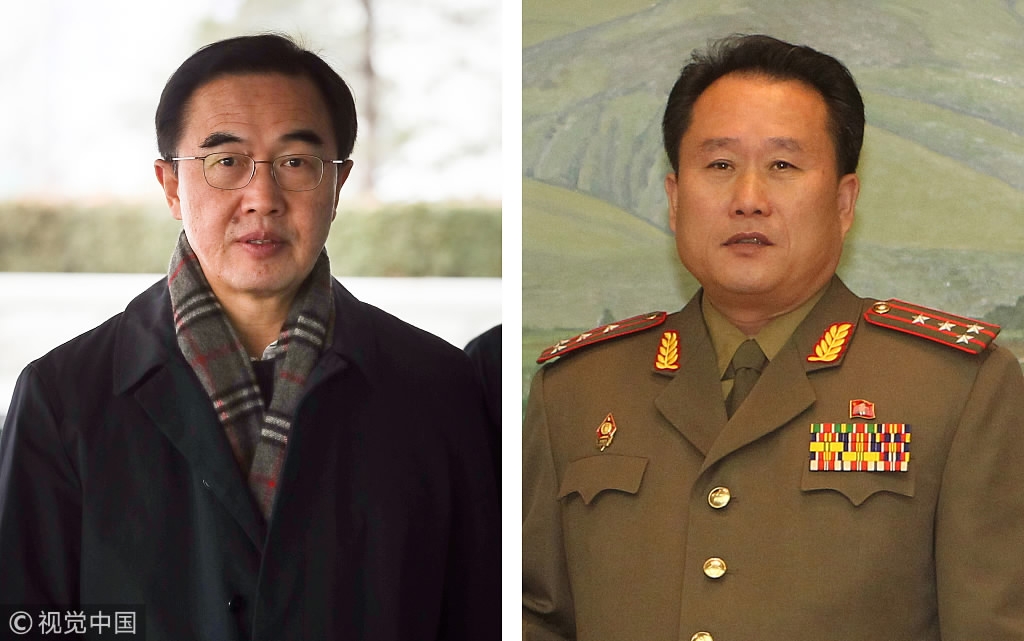
The ROK's Unification Minister Cho Myoung-gyon (L) and Ri Son Gwon (R), the DPRK's chairman of the Committee for the Peaceful Reunification of the Fatherland. /VCG Photo
The ROK's Unification Minister Cho Myoung-gyon (L) and Ri Son Gwon (R), the DPRK's chairman of the Committee for the Peaceful Reunification of the Fatherland. /VCG Photo
The first high-level talks between the two Koreas in two years will be held in the truce village of Panmunjom where the two sides have historically held talks.
The DPRK's International Olympic Committee (IOC) representative Chang Ung Saturday said the
DPRK was likely to participate in the Winter Olympics, a positive signal before the upcoming talks.
On the DPRK side, only two skaters have qualified for the Winter Olympics, though both have missed the deadline. However, ROK President Moon, himself an Olympic ambassador, said that the rules could be flexible.
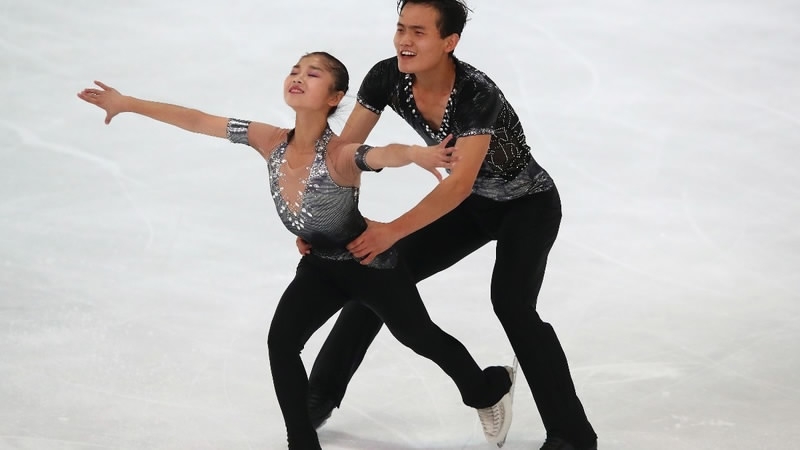
DPRK athletes Ryom Tae Ok and Kim Ju Sik compete at the Olympic Qualifying ISU Challenger Series in Oberstdorf, Germany, September 29, 2017. /Reuters Photo
DPRK athletes Ryom Tae Ok and Kim Ju Sik compete at the Olympic Qualifying ISU Challenger Series in Oberstdorf, Germany, September 29, 2017. /Reuters Photo
What else is on the agenda?
Aside from the Olympics, the two sides are expected to also bring up their own issues of interest.
Baek mentioned the ROK will prepare to discuss issues of mutual concern, including military and humanitarian issues, which President Moon proposed last year.
"We will prepare for discussions on the issue of separated families and ways to ease military tensions," the spokesman added.
Commentators are speculating that Pyongyang could put the resumption of tours to Mount Kumgang and the reopening of the Kaesong Industrial Complex on the agenda.
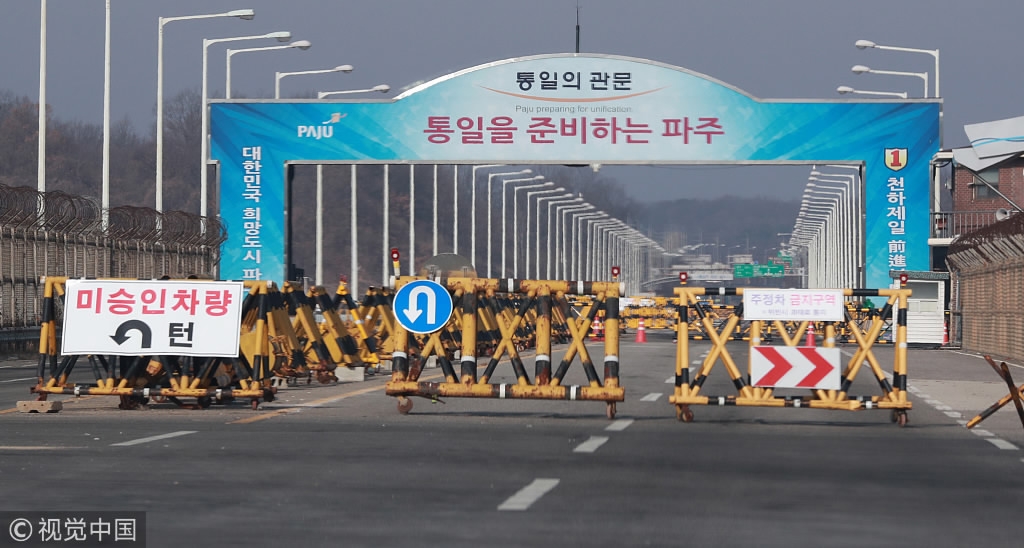
A checkpoint on the Grand Unification Bridge, which leads to the truce village Panmunjom, just south of the demilitarized zone separating the two Koreas. /VCG Photo
A checkpoint on the Grand Unification Bridge, which leads to the truce village Panmunjom, just south of the demilitarized zone separating the two Koreas. /VCG Photo
The ROK closed down the inter-Korean industrial zone in Feb. 2016 in response to Pyongyang's fourth nuclear test.
Experts analyzing the DPRK side say that the country could demand some type of concession from the ROK, such as removing sanctions or canceling next year's US-ROK military drill.
Meanwhile, the size of the delegation and the route it would take into the country could all become sticking points during the talks.
Experts emphasize that the meeting needs to be run carefully. If talks were to collapse, it could even worsen the already tense situation on the Korean Peninsula.
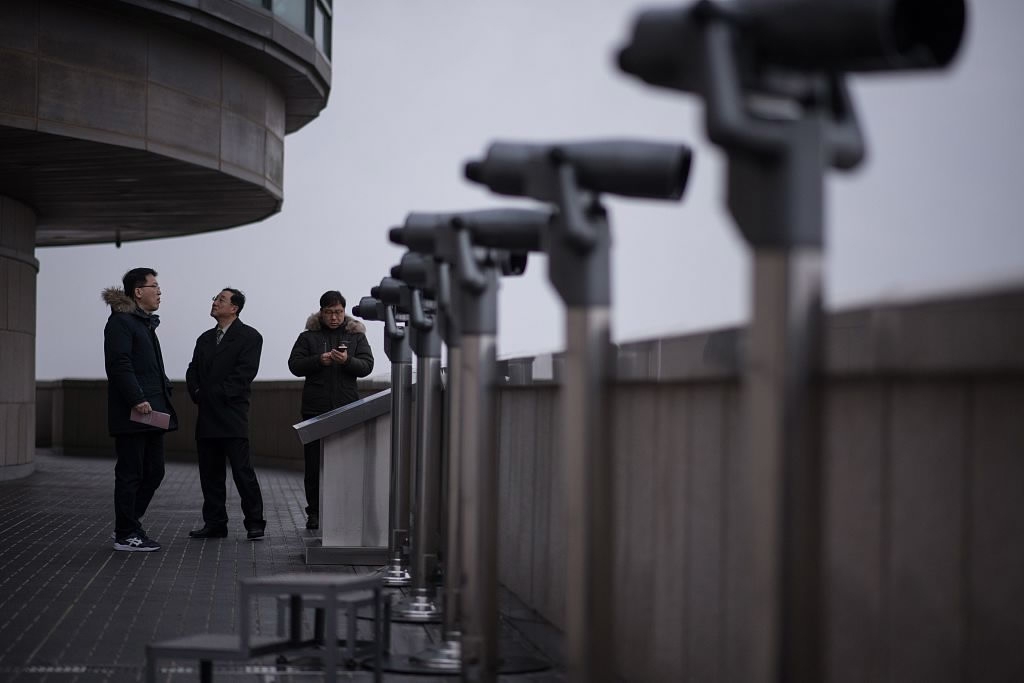
People standing next to binoculars facing the DPRK at an observatory overlooking the Demilitarized Zone (DMZ) in Paju, January 4, 2018. /VCG Photo
People standing next to binoculars facing the DPRK at an observatory overlooking the Demilitarized Zone (DMZ) in Paju, January 4, 2018. /VCG Photo
Reactions from China, US and Japan
The tone on the upcoming talks from relevant parties – China, the US, and Japan – have varied.
China has welcomed the talks and expressed hope that the parties can seize the positive signs to put the issue back on the track of peaceful settlement through dialogue.
China has also sent its special envoy on Korean issues to Seoul on Friday for consultations.
On the US side, President Donald Trump has continued his war of words with Kim Jong Un, by declaring that he had a much bigger "nuclear button." On the other hand, on Saturday Trump claimed that he "always believes in talking." But he quickly added that any talks would come with conditions, which he did not specify.
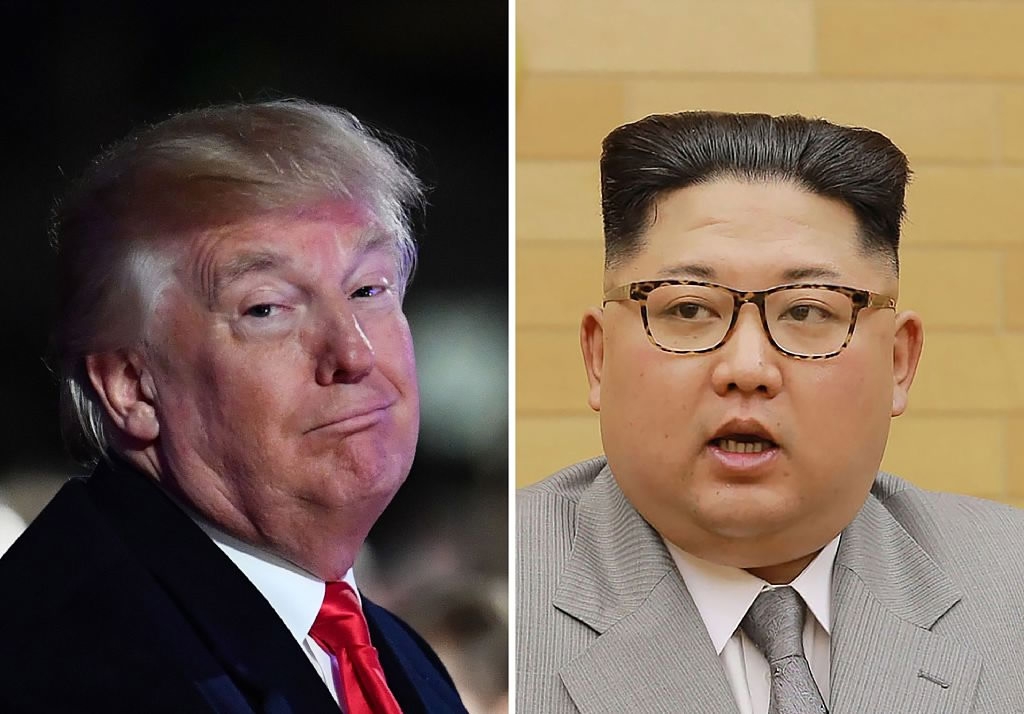
A photo taken on November 30, 2017 of US President Donald Trump (L) smiling during the 95th annual National Christmas Tree Lighting ceremony in Washington, DC ; and a picture of DPRK leader Kim Jong Un (R) delivering a New Year's speech at an undisclosed location on January 1, 2018. /VCG Photo.
A photo taken on November 30, 2017 of US President Donald Trump (L) smiling during the 95th annual National Christmas Tree Lighting ceremony in Washington, DC ; and a picture of DPRK leader Kim Jong Un (R) delivering a New Year's speech at an undisclosed location on January 1, 2018. /VCG Photo.
Trump's team also took a tough stance on the DPRK. US Defense Secretary James Mattis said on Thursday that it was unclear whether the agreement was "a real olive branch" or a "one-off from (Kim Jong Un)," while US Ambassador to the United Nations Nikki Haley said, "there is no turnaround" with the DPRK.
Japan remains skeptical of the DPRK's motives, with Prime Minister Shinzo Abe emphasizing that Japan now faces its greatest danger since World War II, in his New Year speech. Abe stated that a DPRK armed with nuclear weapons is "unacceptable."
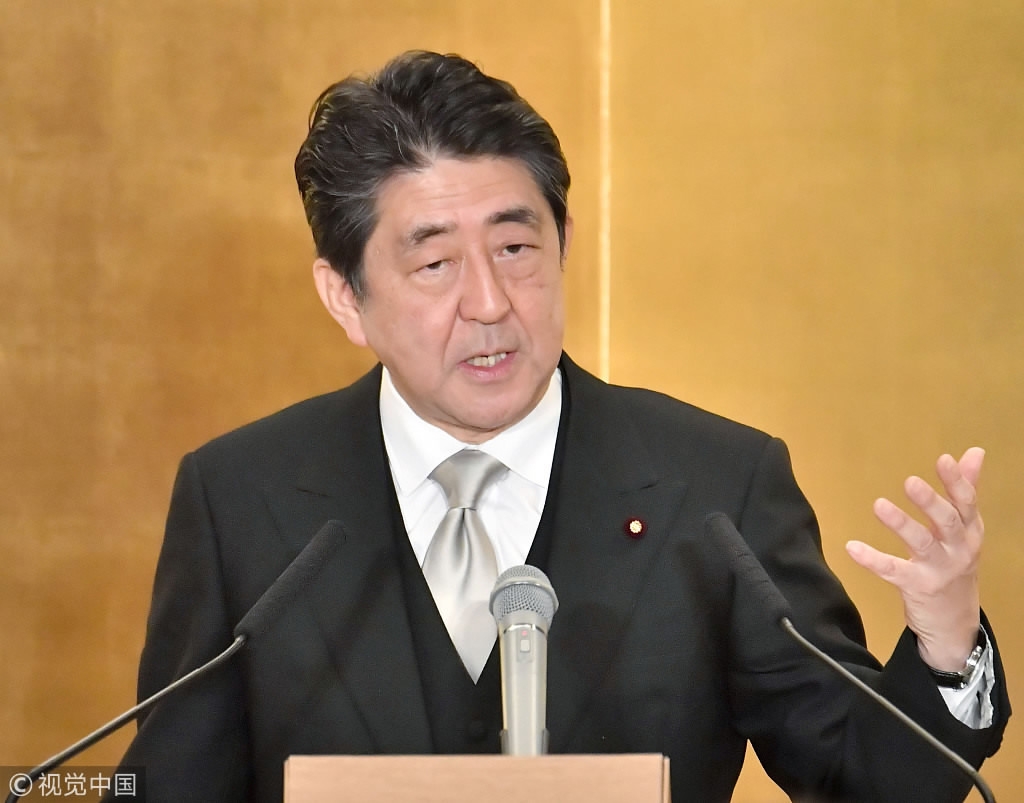
Japanese Prime Minister Shinzo Abe speaks at a New Year press conference in Ise, Mie Prefecture, Jan. 4, 2018. /VCG Photo
Japanese Prime Minister Shinzo Abe speaks at a New Year press conference in Ise, Mie Prefecture, Jan. 4, 2018. /VCG Photo
Japan's defense minister also said the DPRK only wanted to have apparent dialogue and would not stop its nuclear weapons program.

